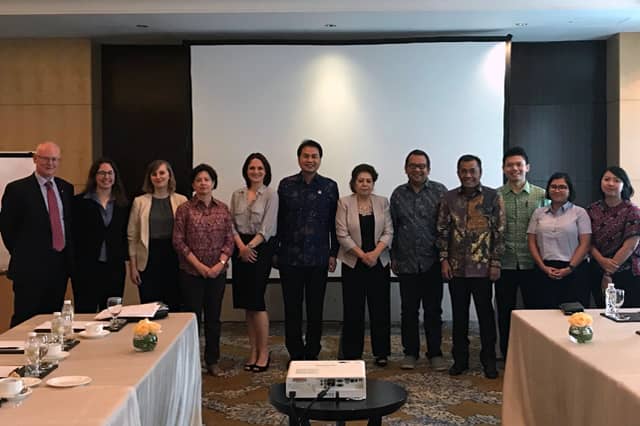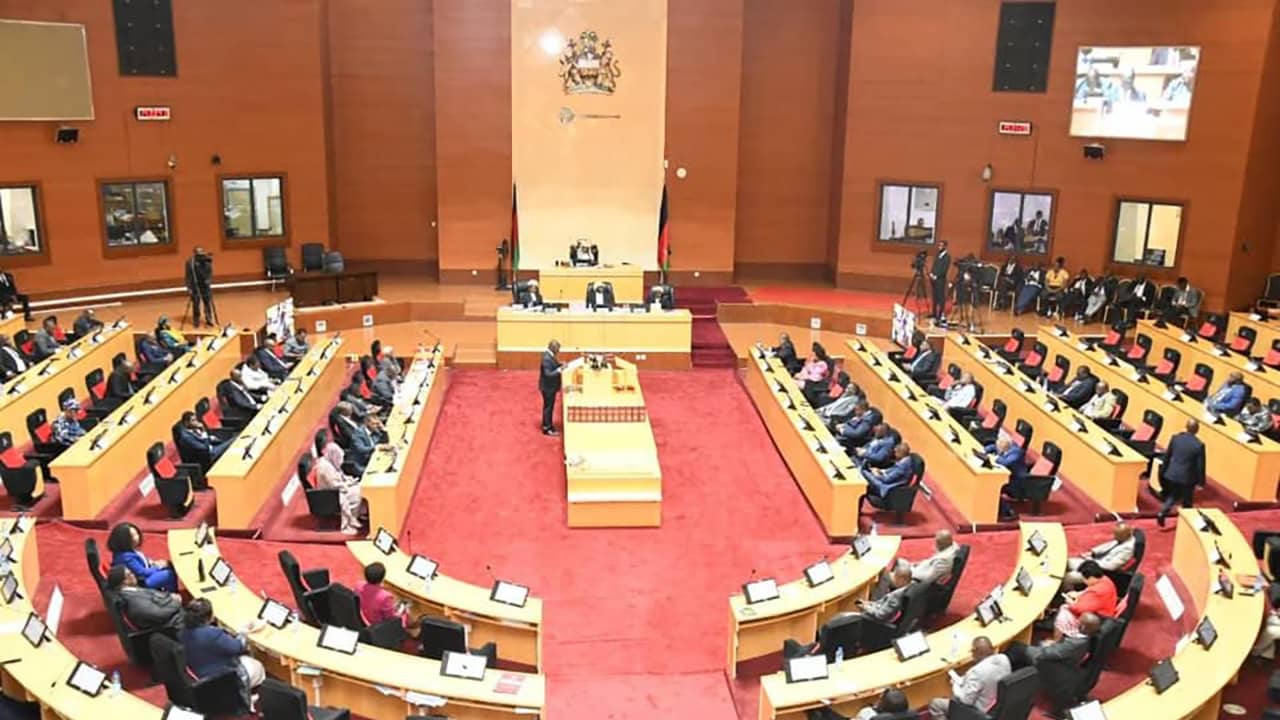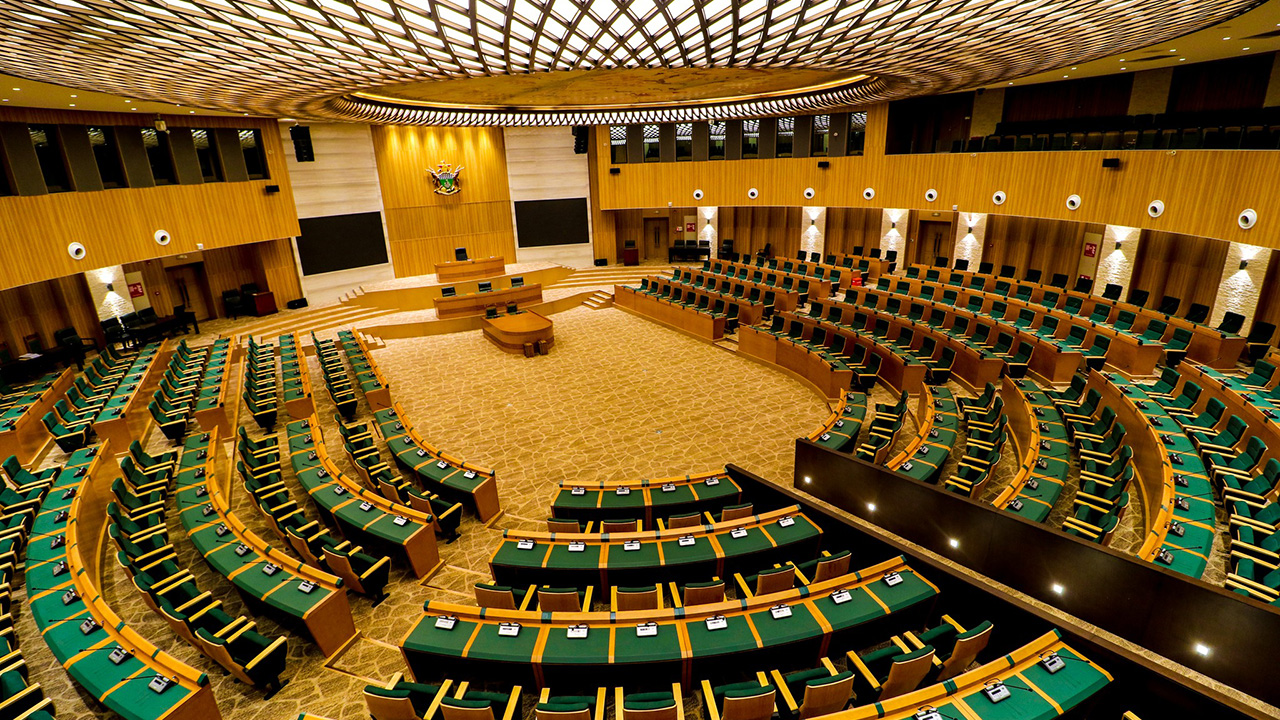
On 7 May 2018, parliamentarians and representatives from civil society met in Jakarta (Indonesia) for Parliamentary Consultations on the Indonesian Judicial System, Penalties and Human Rights in the Reformed Draft Criminal Code. This consultation was convened by Parliamentarians for Global Action (PGA) in partnership with the ECPM/Ensemble contre la peine de mort, with support from the European Commission and the Australian Department of Foreign Affairs and Trade.
The consultation was chaired by Hon. Dr. Azis Syamsuddin, Member of the House of Representatives, Member of Commission III on Law and Legislation, Human Rights, and Security Affairs, and the Budget Committee, and PGA Member.
Hon. Tb. Soenmandjaja, Member of the House of Representatives, Member of Commission III on Law and Legislation, Human Rights, and Security Affairs, and PGA Member, and Hon. Dr. Syamsuddin both explained the history of the quest to reform the Criminal Code. The current Code was inherited from the colonial power and has yet to be reformed since Indonesia’s independence from the Netherlands. They underlined that there is a clear need for the Code to be updated with values from customary law and adapted to social developments in Indonesia.
Hon. Soenmandjaja clarified that the Government and Parliament have been working on a reform of the Criminal Code bill for more than 30 years and that this Reformasi process has moved forward significantly in the recent years, with a bill finally in discussion in the relevant Working Group of the House of Representatives. However, during the present parliamentary session, the bill has not moved forward, as the Working Group awaits the Government’s input. Hon. Dr. Syamsuddin further elaborated that this bill has received a lot of attention internationally, with the German Parliament having visited Jakarta to discuss the issues of death penalty and adultery with their Indonesian counterparts.
Senator Taghreed Hikmat, Member of the Senate of the Hashemite Kingdom of Jordan, PGA Member; first woman Judge in Jordan and former Judge at the UN International Criminal Tribunals, shared her experience, especially with regards to the death penalty and Islam. She explained that Jordan has not known a single political execution since the creation of the country. In 2006, King Abdullah II suspended the death penalty, despite the country being majority Muslim. She recognized that capital punishment was reinstated in 2014, after a terrorist act created massive public uproar. However, Sen. Hikmat stressed that, although Islamic countries may not be able to abolish death penalty right away, they must reduce the numbers of capital crimes and executions, step by step, in order to follow the teachings of Prophet Muhammad. She quoted the Holy Qur’an: “if anyone kills a person […] it would be as if he killed all people. And if anyone saves a life, it would be as if he saved the life of all people” (Qur'an 5:32). She also underlined that the Prophet has said that “it is better for the ruler (al-imam) to err in forgiveness than for him to err in punishment” and concluded: “those are words of tolerance”.
Adding to her arguments stemming from religion, Sen. Hikmat then touched upon her career as a judge. She underlined that international criminal tribunals – where she herself judged individuals accused of genocide - do not apply capital punishment, even though they have jurisdiction over the most serious crimes. Sen. Hikmat also described her work at the Higher Court, where she had to face five death penalty cases, which caused her great anxiety as she tried to find ways to avoid giving a death sentence. She explained that, as she could no longer be responsible for death sentences being carried out, she had to quit being a judge and thus became a senator. However, she stressed her conviction that the law may be rigid but judges are human: they must use their humanity in applying the law.
Mr. Julian McMahon, Barrister and Board Member of Reprieve Australia, called on the Indonesian Parliament to learn from other experiences of criminal reform, which every country has had to go through at one point. He underlined that every country has its lot of wrongful convictions which had led to innocent people being executed. For example, he mentioned that no less than 140 individuals had been exonerated in Australia thanks to improved science and updated evidence. Mr. McMahon also cited a research study conducted in Japan, which showed that a nuanced approach to death penalty and detailed questions can result in people changing their minds and the public opinion’s support for capital punishment decreasing.
Mr. McMahon welcomed the insertion in the Reform Bill of a provision implementing the 2007 Constitutional Court’s decision, which found that a 10 years delay had to be implemented after a death sentence before execution to see if rehabilitation was possible. He stressed that rehabilitation is indeed the best thing for society and that this provision should also allow the judicial system to catch judicial errors before it is too late. Mr. McMahon highlighted that 50 years of research have shown that the death penalty has no deterrent effect.
In response to a question from Hon. Dr. Syamsuddin, Mr. McMahon stressed that, even if the 23 countries where executions have taken place during the past year have justified maintaining the death penalty because of public support for it, public opinion can be influenced by political leadership. He mentioned the example of France, where abolition resulted from a strong commitment of the President, against public opinion. Once capital punishment was abolished, the public’s attitude swayed and, today, French public opinion strongly opposes the death penalty. He emphasized that politicians must show leadership with regards to this very important and pressing issue.
Mr. Anggara Suwahju, Research and Executive Director at ICJR, then took the floor to share some of civil society’s concerns regarding the Reform Bill. While he also welcomed the inclusion of a 10 year probation provision, he stressed that the new Criminal Code also contained an increased number of capital crimes. He also shared the concern that the current version of the bill provides a very limited possibility of parole. Finally, he regretted that the possibility for civil society to give input on the bill was merely theoretical, as in practice it is actually very difficult to access the text of the bill, which has not been made public, a concern shared by Mr. Ricky Gunawan, Lawyer, Director of the Community Legal Aid Institute at LBH Masyarakat.
In response to Mr. Suwahju’s question, Hon. Sarifuddin Sudding, Member of the House of Representatives, Member of Commission III on Law and Legislation, Human Rights, and Security Affairs and PGA Member, explained that the discussion between the Parliament and the Government on the provisions on the death penalty and probation had reached a deadlock, with no agreement on how to articulate these provisions. He stressed, however, that a strong political will to finish the bill exists because of the upcoming electoral year, even if there is a need for more debate before the bill can be published. He stressed that Commission III does welcome input from national and international civil society.
Pursuing a deeper debate and understanding of the current situation, Mrs. Marie-Lina Samuel, Coordinator of the Asia/Africa Project at Together Against the Death Penalty (Ensemble contre la peine de mort, ECPM), then asked the MPs present what would be the next step for abolition in Indonesia and what will be Indonesia’s position regarding the UNGA’s resolution. Hon. Syamsuddin responded that all of the input received from NGOs, religious leaders, civil society, etc., will be considered but the Bill has to be discussed by Parliament and the Government. He stressed that Indonesia is a sovereign Muslim-majority nation and that the UNGA vote depends on the Government and will be considered only once the Criminal Code is adopted.
Mrs. Marion Chahuneau, Legal Officer in the International Law and Human Rights Program of PGA, then asked the MPs if Parliament had heard or was willing to hear from several Islamic scholars, coming from different points of view, on the position of Islam regarding the death penalty. Sen. Hikmat followed up Ms. Chahuneau’s question by explaining that the teachings of Mohammed are that the death penalty cannot be passed if there is not a 100% certainty of the guilt of the accused, underlining that not all scholars may have the same interpretation of the Holy Qur’an. Hon. Dr. Syamsuddin and Hon. Soenmandjaja replied that they had listened to all stakeholders, without a preference for a particular school of thought. They explained that they have received input from all religious leaders and schools, as well as sociological, legal and other academic leaders.
In conclusion to the consultations, Ms. Barbara Lochbihler, MEP (Germany), Vice-Chair of the Human Rights Committee of the European Parliament; and Convenor of the International Law and Human Rights Program of PGA, explained the goals and strategies of the PGA’s International Law and Human Rights Program, stressing that the Indonesian Members of Parliament needed to take action, and, in particular, to take steps towards abolishing the death penalty. Hon. Dr. Syamsuddin received her advice by saying: “we respect international MPs but Indonesia is a sovereign country that needs to consider how to prevent crimes on its own territory. We are reforming the Criminal Code on behalf of our nation and for our young people.”
Hon. Dr. Syamsuddin then concluded the session, stressing that he and his fellow MPs cannot say whether the government will take the arguments raised during the session into account but that he and his colleagues present promise to bring the issue to them.




